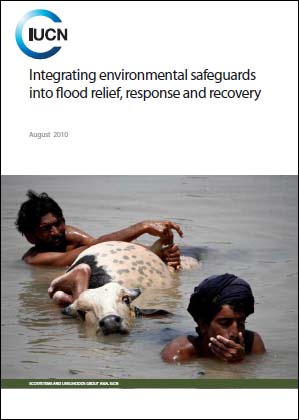Integrating environmental safeguards into flood relief, response and recovery
Pakistan has been affected by the worst floods in living memory – according to government figures almost 14 million people have been affected. When a disaster of such magnitude occurs, saving human lives, alleviating suffering and reducing economic loss take priority. During this phase of disaster management – relief and response - emergency needs, water supplies and sanitation, food aid, setting up shelters, health needs must be supplied in the shortest possible time.

Photo: IUCN Pakistan
Environmental issues are never considered during this phase. Barring rapid environmental assessments that are carried out in the aftermath of a disaster, at best, the role of biologists is minimal; at worst, non-existent during this period. At this stage, environmental concerns are seen as an unwanted luxury. This view is held even by many biologists concerned with environmental issues.
However, it can not be over-emphasised that during this phase, much environmental damage can be caused, endangering the sustainability of recovery and, in turn, rebuilding. During this phase, there can be a great deal of over-exploitation (for example, of timber) and much habitat destruction (for example, clear-felling forests to make temporary shelters) because the immediate goal is to get roofs over people’s heads, at whatever cost. Also during this phase, the rush to get food and other emergency supplies also results in much environmental damage. Often, these supplies have to be packed in non-degradable packing such as plastic. Irresponsible disposal of large quantities of such waste can create enormous ecological and health problems. Debris created by the hazard is often cleared into ecologically sensitive habitats - such as lagoons and wetlands - that sustain livelihoods, or protected areas - that provide other ecosystem services - causing further damage.
EXPERT OPINION
Interview opportunities with experts in IUCN’s Pakistan and Head Office:
Shah Murad Aliani, Country Representative, IUCN Pakistan
Email: shah.murad@iucn.org
James Dalton, Water Management Advisor, IUCN Water Programme
Email: James.dalton@iucn.org
TO BOOK INTERVIEWS FOR RADIO, TV AND PRINT PLEASE CONTACT:
Michael Dougherty, Regional Communications Coordinator, IUCN Asia Regional Office, t +66 2 662 4029 (ext 142), m +66 81 371 4687; e Michael.dougherty@iucn.org
Borjana Pervan, IUCN Media Relations Officer, t +41 22 999 0115, e borjana.pervan@iucn.org
Claire Warmenbol, IUCN Communications Manager, Water Programme, t +41 22 999 0188, e claire.warmenbol@iucn.org
Following guidelines were produced by IUCN after the devastating earthquake in 2005 and cyclone in 2010.
- Preliminary Environmental Assessment of the Earthquake in Pakistan, IUCN Field Mission Report
- An Assessment of Environmental Risks and Needs Based on IUCN Field Missions to NWFP and AJK, November 19–26 and December 4–7, 2005
- Hearing their Voices: The Women and Children in the Earthquake Affected Areas of Pakistan
- Integrating environmental safeguards into cyclone relief, response and recovery, June 2010
